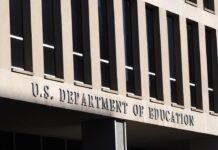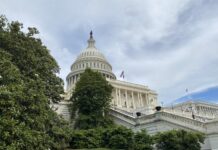
(GA Recorder) | WASHINGTON — Federal health officials now recommend states again use the COVID-19 vaccine from Johnson & Johnson, but now also hand out updated fact sheets that will warn about rare blood clots in women that paused the vaccine’s use.
Top U.S. health officials swiftly acted on the guidance by an advisory panel, with the Food and Drug Administration and Atlanta’s Centers for Disease Control and Prevention announcing Friday evening that they were urging states to end the sudden, 11-day suspension of the vaccine’s use. There would be no new restrictions added on who’s eligible for the J&J shot.
Restarting the vaccine’s use will put a greater burden on state and local health departments, which handle the day-to-day vaccination campaigns, to ensure women between 18 and 50 are informed about the risks and benefits of receiving the one-shot J&J vaccine.
“I voted yes, but I am concerned that consumers, and women in that age group, in particular, will not be adequately informed” by the fact sheets for vaccine recipients referencing the blood-clot risk, said Dr. Beth Bell, an advisory panel member and a University of Washington professor.
She added that state and local health agencies will primarily be ensuring that people “are informed and are empowered.”
Last week’s federally directed pause was intended to educate health care providers and the public about warning signs of the condition known as thrombosis with thrombocytopenia syndrome, or TTS, which was reported in six women who had received the vaccine.
Symptoms can include severe headache, abdominal pain, leg pain, or shortness of breath, and the condition has been found in those who have received the vaccine one to two weeks beforehand.
By Friday’s day-long hearing, 15 cases of the blood-clotting disease had been identified, along with three deaths. All have been among women, and seven of the cases have been women between ages 30 and 39.
Regulators and other public health experts have emphasized that these cases were out of 8 million doses administered so far, with 4 million of those doses going to women. But the clotting condition can lead to potentially fatal brain bleeds and requires a specific anti-clotting medication, factors that spurred the intense federal review.
The independent advisory panel met last Friday to weigh whether to lift the pause, but members decided they needed additional data to determine if there were any clear risk factors that could be identified. The CDC panel is made up of outside experts.
Risks and benefits
During this week’s public hearing, the panel weighed modeling from CDC officials on the risks and benefits of resuming vaccinations.
Those projections found that if the vaccine was again recommended for anyone over 18, there could be 26 to 45 cases of the blood-clot condition over a six-month period, but 800 to 3,500 fewer ICU admissions and 600 to 1,400 fewer deaths attributable to COVID-19.
Federal regulators also described what they’ve heard from state and local officials about how vaccination efforts would be affected if the J&J vaccine is not available.
Requiring just one dose and easier storage requirements, many jurisdictions said the J&J dose gave them more flexibility in reaching those who are homeless, homebound, or incarcerated, as well as college students.
Without it, some localities said they would be concerned about some recipients who are less able to return for a second dose. Both of the other vaccines available require two doses.
The panel considered but ultimately declined to restrict the vaccine to adults over age 50. The main change compared to before the J&J pause will be additional language in the fact sheet given to recipients when they receive the shot.
The center’s officials also said they plan to release additional public educational materials to explain the risks and benefits of receiving the vaccine and to raise awareness among women before they get to a vaccination site.
José Romero, the advisory panel’s chairman and director of the Arkansas Department of Health, said the decision to restart the vaccine without any restrictions will require health care providers to also actively ensure their patients are fully informed about the vaccine.
“It is our responsibility as clinicians to make sure women understand this risk, and when possible, that they have an alternative at the same site,” Romero said.
Softening demand for vaccines
The advisory panel’s 10-4 decision comes as the U.S. is facing new challenges in the vaccination effort.
More than half of those over age 18 have received at least one vaccine dose so far, and some areas of the country are seeing softening demand for doses. The focus now is on reaching those who are hesitant or skeptical about receiving a coronavirus vaccine.
Meanwhile, public opinion polls have suggested a drop in support for the J&J vaccine, even as other surveys have indicated the pause had been viewed as the federal government responsibly monitoring vaccines.
Americans, regardless of political affiliation, felt health officials were acting responsibly by recommending the pause in the one-dose vaccines, with 87% of Republicans and 91% of Democrats agreeing, according to an Axios/Ipsos poll.
Asked Friday ahead of the hearing about public hesitation if J&J vaccinations were to resume, the CDC director, Dr. Rochelle Walensky, replied that she believes “there’s plenty of people who are interested in the J&J vaccine, if just for convenience.”







